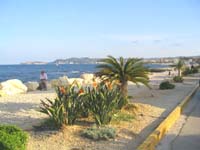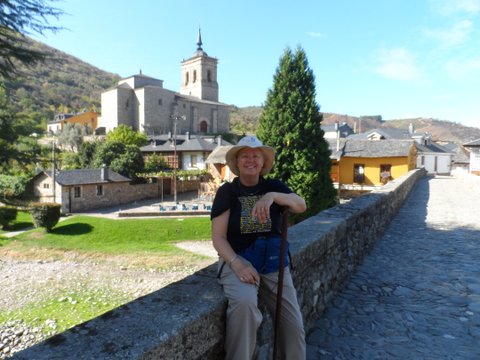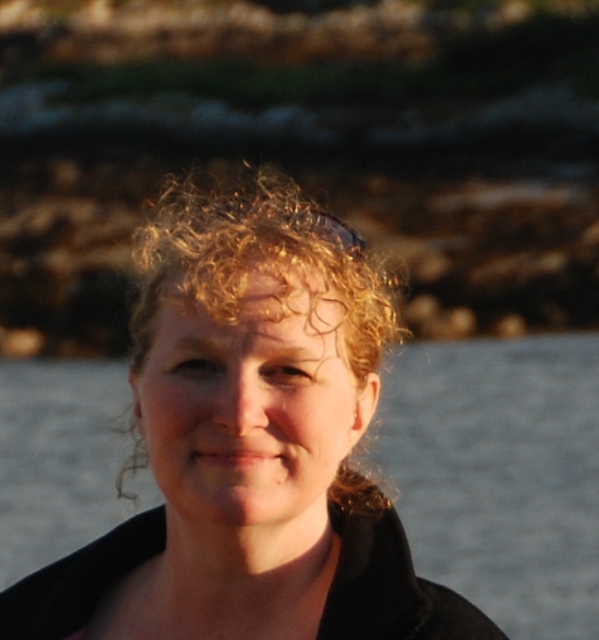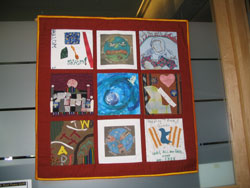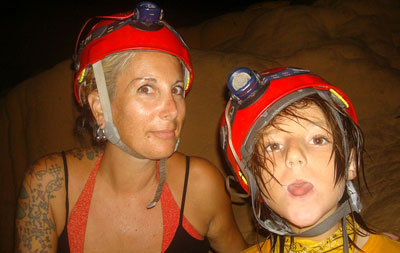I had an opportunity to meet Karla last year on one of my trips to Spain. My interview preview will give you a bit of background on our meeting. Karla is a fascinating individual, a painter, writer and overall creative person, but also an entrepreneur with a bit of an alternative flair. Here is what she has to say about her experience as a North American expatriate living in Spain.

Karla, enjoying life in Spain.
1. Tell us a bit about your background. Where did you grow up, what is your educational background and what did you do before you moved to Spain?
I was born in Toronto and raised in a small provincial town called Bowmanville – just east of Toronto. I moved back to Toronto after high school and attended Humber College in Rexdale where I studied creative arts – like fashion design, photography and writing. After college, I opened my first enterprise – a boutique in Toronto’s trendy Queen St. area – that sold weird and wonderful wearable art objects.
I sold that business in 1983 and went to the University of Waterloo where I received an honours degree in Fine Arts. I graduated in 1990 – and started my second enterprise – called Zona Communications. It was a communications company – and I jumped into the internet with both feet. I went on to build my first Internet enterprise – which I sold to a California company in 2000. I lived in sunny southern California after the sale of my enterprise – until the New York World Trade Centre tragedy – September 2001.
I packed up everything and went back to Bowmanville. Then 10 days later – I packed some items and flew to Zurich, Switzerland and married my long-time Spanish boyfriend – who had been working in Zurich for 8 years. We packed up his apartment – and by December 2001 – Christmas – we moved to Spain.
2. You now live on the Costa Blanca in Spain. How long have you lived there and what made you move there?
We have been here since December 2001. We didn’t know where we were going to live – so the first logical place to go was to where Jose, my husband was born – Xativa. This is a castled city in the interior of the province of Valencia. We lived there for 6 months. We were unemployed and free to travel around Spain – as it was our honeymoon. We bought a 4×4 and traveled up mountains and down into valleys and places that no tourist would ever think of going.
However, we really wanted to move out to the coast – to the sea. We had met in a fishing / holiday village called Javea – back in 1988 – when I was a University student. I came to Spain twice – on student loans – to study art at the Prado in Madrid. Then, I would head out to the coast to party and hit the beaches.
My Spanish sweetie was a waiter in a fine little restaurant called – El Solomilllo – right on the beach. We fell into a crazy kind of love – and spent two wild summers together. We kept in touch for the next years though a friend – until the Internet was developed.
When we came to visit Javea from Xativa we found an old friend, Carmelo. He gave my husband a job and we moved over to the coast. We now make Benitachell our home – which is only five minutes from Javea.

The waterfront in the scenic little town of Javea.
3. What is it like to live in Spain? What are the main cultural differences between living in North America and living in Spain? What was the adjustment phase like initially when you moved there?
Spain is an old culture, full of raw passion, tragedy, love and a fascination with the macabre. It takes some time to get used to the intimate nature of the people. They are a nation of huggers and kissers. In North American culture where a handshake is normal to greet people, here in Spain it is a hug and a kiss on both cheeks. This is standard for men and women. No one ever thinks that you are gay because you are kissing a member of the same sex. This is a silly notion.
Spain is a noisy country. They have a great love of fireworks. Motorcycles do not have mufflers and they roar like big beasts through the streets. People don’t talk to each other – they yell. A North American would think that fight is taking place in a bar when the Spanish get going. But they are not fighting, this is normal communications.
Spain is a dangerous country. Every criminal who flees persecution in their own country comes to Spain. Every type of mob is here, Russians, Romanians, Italians, Yugoslavians. Plus every killer soldier left over from some Central European war. Terrorism has been a common scenario in Spain thanks to the Basque separatist movement (which learned everything they know from Canada’s FLQ). Every week, an unknown body will show up dead in a ditch due to some Columbian drug payment that didn’t get paid.
Drinking and Driving in Spain is normal. Death is cheap on the motorways. Every weekend families say goodbye to loved ones as the jaws of death scrape the mangled bodies of young and old from a twisted up piece of metal that used to be a car. Beer is not considered a dangerous drink, yet it has a 5% alcohol content. If you do need to get one you can go through the Drive-Thru window at your nearest McDonalds. Both wine and spirits are very cheap in Spain – so it is an alcoholic’s dream come true.
Smoking is not prohibited and cigarettes are very cheap. Everyone here starts smoking at a very young age. The women stay nice and thin as they don’t eat, they just smoke. Everyone has black circles under their eyes. The mix of the cheap brandy and cheap cigarettes creates for very smelly people.
4. You have now spent several years living in Spain. What places have you seen? What festivals have you experienced? What gastronomic pleasures have you enjoyed?
Our favourite festival is the Fallas Festival in Valencia. We look forward to the first two weeks of March with such passion. It is the most amazing festival both visually and emotionally. The combination of art and fire, noise and danger – it all comes together in this festival.
We have so many favourite foods – like paella and sausages packed with pork and mountain grown herb. We love flan and rice puddings. We love all types of seafood and fresh veggies from the market.
